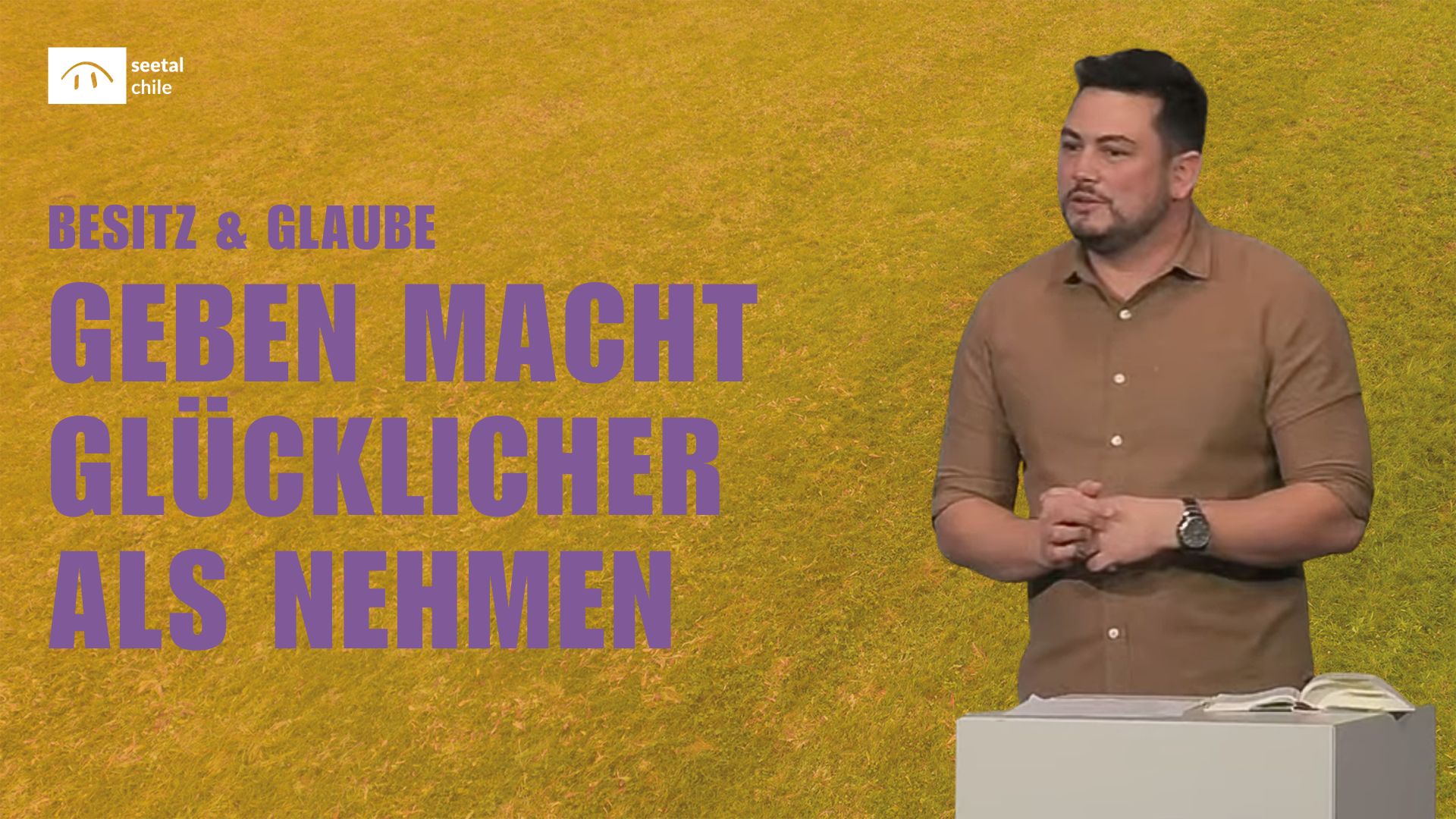Your own heart & faith | Guard your heart
Series: EIFACH muetig – with Jesus as a role model | Bible text: Proverbs 4:23
As with a precise control system, it is the heart that determines function or misbehaviour in life. The Bible warns: «More than anything else, guard your heart.» A hardened heart comes from unbelief, doubt and rebellion; an undivided heart comes from trust, faith and devotion. Those who look to the unseen and obey God’s voice experience his strength, peace and joy – and remain inwardly alive and spiritually receptive.
In my previous job, I built control systems for autoclaves. An autoclave is a gas-tight, sealable pressure vessel that is used to sterilise materials and instruments using steam under high pressure. At first glance, you might think that the eye-catching pressure vessel is the centrepiece of such an apparatus. However, it is actually not the container that determines the effectiveness of the sterilisation process, but the control system. Microorganisms such as bacteria, viruses and spores can only be reliably killed if the control system works flawlessly. This is why a great deal of time and care is invested in troubleshooting when creating the control software.
It is the same with us humans: The decisive factor for our behaviour and nature is not our visible body, but our heart. It influences our whole life. That is why Proverbs says: «More than anything else, guard your heart, for life emanates from it» (Proverbs 4:23 SLT). The source of life springs from the heart. That is why Solomon, the author of Proverbs, recommends guarding our heart more than anything else.
The heart is the very core of the human being – the centre of our personality, the place of our thoughts, feelings, desires and decisions. In the Bible, the heart is not just the seat of our emotions, but the control centre that determines our entire life. That is why God’s Word calls out to us: «More than anything else, guard your heart!» Why should we preserve it more than anything else? So that it does not become sluggish or proud, hardened or even obdurate.
A hardened heart
The Bible uses various terms for bad states of heart: a hardened, hardened, proud, wrong or divided heart. The problem of a divided heart is particularly serious. «Such a man does not think that he will receive anything from the Lord, a man with a divided heart, unstable in all his ways» (James 1:7f SLT).
About Pharaoh it says: «I will harden his heart» (Exodus 4:21; 10:20, 27). But it is also written: «Pharaoh hardened his heart» (Exodus 8:11, 28). Although he admitted that he had sinned against God during the plagues of hail and locusts and that the LORD was right, his heart remained unteachable. His obduracy was so devastating that it ultimately led to the destruction of his entire army.
What is almost more frightening is that Jesus» disciples also had hardened hearts. Jesus mentions this twice – both times in connection with the multiplication of the loaves:
- After the feeding of the 5000 (Mark 6): Jesus compels His disciples to cross the lake by boat. He wants to pass them on the water in the middle of a storm. When they see Him, they are scared to death because they think He is a ghost. «Then he got into the boat and the wind died down. They marvelled at what was happening before their eyes. They still had not realised what the miracle of the multiplication of the loaves meant, for their hearts were hardened and they did not believe» (Mark 6:52f NLB).
- Only two chapters later, after 4000 people had been fed by a miracle, Jesus says: «Why are you worried that you have nothing to eat? Will you never learn or understand? Are your hearts too hardened to understand?» (Mark 8:17 NLB). The Greek word for «harden» is poroo and means: to encrust, harden, dull, become numb.
The reason was that the disciples did not understand the miracle of the multiplication of the loaves spiritually. How is it possible that people who lived with Jesus for three years and saw how the dead were raised, lepers cleansed, the sick healed and the possessed freed through them had hardened hearts?
If even the disciples of Jesus were affected by this, then every follower of Christ should be careful to guard his heart throughout his life – so that it does not harden, but remains fully orientated towards the Lord.
So what is the «error in judgement» of a hardened heart? According to the Bible, it is sin, unbelief, rebellion, doubt, insecurity, fear, a focus on the visible and a lack of spiritual discernment. With Pharaoh it was rebellion. For the same reason, God hardened the hearts of his people: «And he said, «Go and say to this people, «Keep on hearing and not understanding, keep on seeing and not recognising. Make the heart of this people insensitive, and make their ears hard, and harden their eyes, so that they will not see with their eyes and hear with their ears, and so that their heart will not come to understanding and they will not be converted and find healing for themselves!» (Isaiah 6:9f SLT). Our hearts harden when the Spirit of God speaks to us – and we don’t respond.
An undivided heart
Good states of heart are a pure, good, sincere, undivided and humble heart. God says to King Asa of Judah: «For the eyes of the LORD roam the whole earth, to show himself mighty in them, whose heart is undividedly set on him. You have acted foolishly in this; therefore you will have war from now on!» (2 Chronicles 16:9 SLT). The message is clear: it is our hearts that determine whether and how we experience God’s power and work. An undivided heart receives the blessing of God.
Jesus says: «It is crucial that you believe and do not doubt it in your hearts» (Mark 11:23 NLB). He explains to Jairus: «Do not be afraid. Only believe» (Mark 5:36 NLB). To Peter He says: «You of little faith, why did you doubt?» (Matthew 14:31 LUT). Peter had faith – otherwise he would not have been able to raise the dead or heal the sick. But Little Faith allowed himself to be impressed by the visible. Fear and doubt rendered his faith ineffective.
A hardened heart asks: «What if I pray for this sick person and nothing happens?» But shouldn’t we rather ask ourselves: «What if the paralysed person gets up? When the tumour disappears? When light falls into the darkness of depression?» Smith Wigglesworth (1859–1947), a British evangelist and preacher, experienced many divine healings. A famous quote from him reads: «I am not moved by what I see. I am only moved by what I believe. I know that no one who believes pays attention to outward appearances. No one who believes thinks about how they feel.» Wigglesworth was not distracted by the visible circumstances.
Abraham was also a man with an undivided heart. God says to him: «I am God Almighty. Live before my face, and be blameless (literally: be whole/undivided with me)!» (Genesis 17:1 ELB). Centuries later, Abraham is described as a model of faith: «But Abraham’s faith remained unshaken, even though he knew that at almost a hundred years old, he was far too old to become a father and his wife Sarah could no longer have children. Abraham did not doubt and trusted in God’s promise. Yes, his faith even grew, and in doing so he honoured God» (Romans 4:19f NLB). Abraham did not doubt, but firmly believed in God’s promise – that is the mark of an undivided heart.
The solution for a hardened heart
It all begins with a clear decision to entrust your whole life to Jesus Christ. Whoever does this receives a gift: «And I will give you a new heart and give you a new spirit. I will take the heart of stone out of your body and give you a heart of flesh» (Ezekiel 36:26 NLB). This is the basis for every undivided heart.
When I realise that my heart has hardened and unbelief is so dominant, Jesus invites me to repent, experience forgiveness and start again.
One of life’s tasks is to «pull the plug» on unbelief. Once the disciples come to Jesus and ask why they were unable to cast out a demon. Jesus replied «For the sake of your unbelief!» (Matthew 17:20 SLT). In other manuscripts it says «Because of your little faith» (LUT). But the problem was not a lack of faith. Immediately afterwards, Jesus says that faith, like a grain of mustard seed, is enough to move a mountain (Matthew 17:21).
It takes a lot of training to put an end to disbelief. We have to «stretch our heads to the sky. «Since you have been raised to new life with Christ, seek Christ, who is seated at the right hand of God in heaven. Do not think about worldly matters, but concentrate your thoughts on him!» (Colossians 3:1f NLB). The gaze of faith should be directed towards the heavenly, invisible and divine – not towards the earthly, visible and transient.
We need each other for this. We should encourage each other to speak of the greatness and possibilities of God – to remind ourselves not to look at the visible, but at the invisible. Otherwise, a creeping adaptation to the world takes place. If we keep focussing on the visible and negative, our hearts harden.
I see this as the main problem in dealing with the media and social networks. They direct our attention – and through the algorithms repeatedly – to the ephemeral, the visible and the earthly. We are distracted from the essentials. We should see through this strategy and resist it. We need spaces of silence. «Be still and recognise that I am God; […] I will be exalted on earth!» (Psalm 46:11 SLT). In the silence of God’s presence, we train ourselves to focus on the invisible, the divine. In silence, we hear God’s voice and all the other voices of this world fade away. In the presence of God, our heart becomes humble, soft and undivided.
«More than anything else, guard your heart, for life emanates from it» (Proverbs 4:23 SLT). As with control software, we must also invest in the proper functioning of our hearts. Our hearts are the control centres that decide our entire lives. It depends on this whether we lead a life of strength, peace and joy – or drift through life without expectations.
Possible questions for the small groups
Bible text: Proverbs 4:23; Mark 6:45–52
- What does it mean for you personally to «guard your heart more than anything else» (Proverbs 4:23)?
- How do you recognise in your everyday life that your heart may be beginning to harden or divide?
- How can we as Christians learn to focus our gaze on the invisible – the heavenly – instead of allowing ourselves to be determined by the visible?
- What steps help you to overcome unbelief and doubt and to grow in trust in God’s promises?
- What role does silence and time with God play in maintaining a soft and undivided heart?




